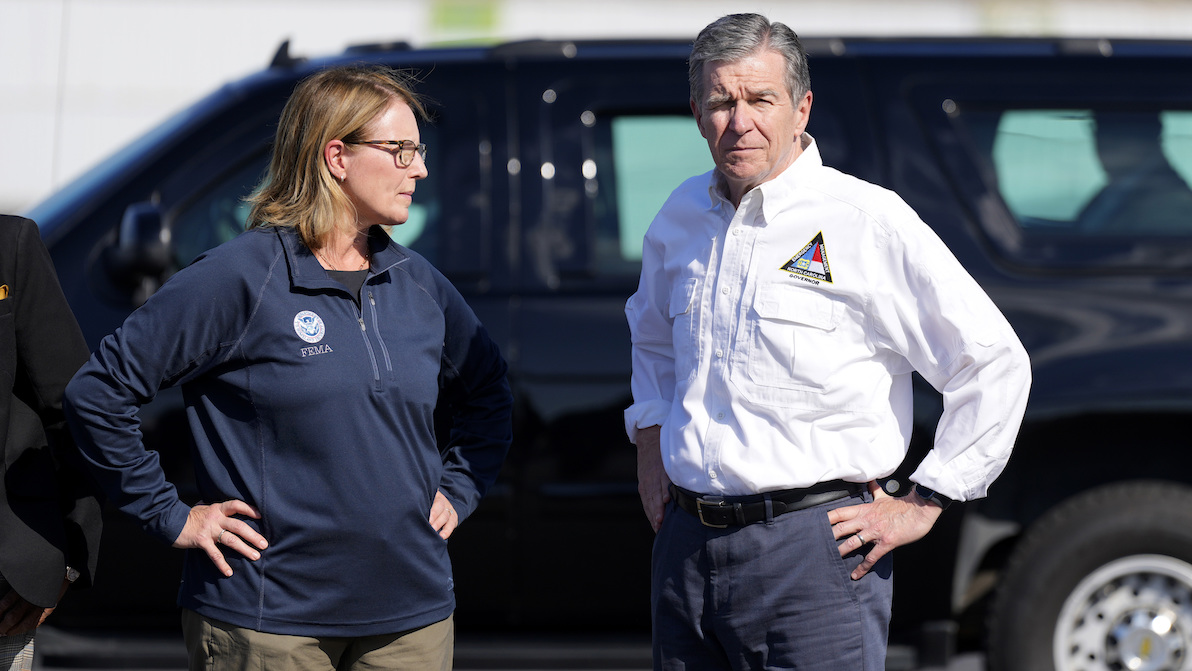Stand up for the facts!
Our only agenda is to publish the truth so you can be an informed participant in democracy.
We need your help.
I would like to contribute

President Joe Biden watches a traditional dance after arriving at Catumbela airport in Angola, Dec. 4, 2024. (AP)
On Dec. 3, during his first trip to Africa, President Joe Biden said the U.S. would provide more than $1 billion in humanitarian aid for Africans displaced by historic droughts and food insecurity.
The crowd in Angola watching Biden’s speech applauded the news politely, but social media users in the U.S. reacted with derision and fury.
Right-leaning accounts and some Republican members of Congress expressed outrage that Biden was giving money to Africans while many in the southeastern U.S. are still struggling to recover from Hurricanes Helene and Milton.
"What about the Americans affected by recent Hurricanes?" conservative commentator Benny Johnson asked on Instagram. "North Carolina would like a word," U.S. Rep. Lauren Boebert, R-Colo., wrote on X.
Former U.N. Ambassador and Republican South Carolina Gov. Nikki Haley wrote on X: "This is infuriating. After pardoning his son and fleeing to Africa, Biden gives a BILLION of our tax dollars to rebuild homes in Africa when we still have people homeless from the hurricane! Completely tone deaf and insulting."
But the claims ignore how domestic disaster relief and foreign aid are funded. Congress separately determines funding for each through appropriations or supplemental bills. The claims also ignore the $3.1 billion the Federal Emergency Management Agency has spent so far responding to Hurricane Helene, which left a trail of destruction across six states in late September, and Hurricane Milton, which struck Florida in October.
"Comparisons between foreign aid and domestic disaster funding often reflect a misunderstanding that aid to other countries reduces resources available for domestic disaster survivors," said Francis Torres, associate director of housing at the Bipartisan Policy Center, a Washington, D.C.-based think tank. "In reality, these funds come from different accounts, with Congressional authorizations for foreign assistance being separate from appropriations for disaster relief and recovery programs."
Complaints about spending taxpayer money on foreign aid instead of U.S. citizens are common. We fact-checked an earlier False claim that Biden announced more aid to Ukraine but no more for Hurricane Helene survivors. And President-elect Donald Trump made a Pants on Fire claim that the Biden administration stole $1 billion from FEMA to use to house migrants.
Foreign aid funding
The money Biden pledged for aid in 31 African countries had already been appropriated by Congress to federal agencies. Most of it comes from the United States Agency for International Development, which is providing about $823 million of the $1 billion. Of the $823 million, more than $202 million comes from the U.S. Agriculture Department’s Commodity Credit Corp., and nearly $186 million comes from the State Department, a USAID press release said.
The remaining money comes from a supplemental bill Congress passed in April, the press release said. The bill provided funding to U.S. agencies "for assistance to Ukraine, Israel, and U.S. allies in the Indo-Pacific region," which includes Africa’s east coast.
In recent years, the U.S., under Democratic and Republican administrations, spent about $50 billion to $70 billion annually on foreign aid, government data shows. That includes humanitarian aid, military assistance and economic development. Torres said that spending accounts for about 1% of the federal budget. The U.S. government spent about $6.75 trillion in fiscal year 2024.
Disaster relief funding
Congress appropriates federal disaster relief funding to the Disaster Relief Fund, which FEMA manages, annually and supplementally. Other congressionally funded federal agencies also factor in disaster preparedness and relief, including the Housing and Urban Development, Health and Human Services and Agriculture departments.
State funding and private insurers also figure predominantly in recovery efforts. North Carolina’s legislature has approved $877 million in relief aid, but that covers only a fraction of the expected $53 billion worth of damage in the state, WRAL reported. Democratic Gov. Roy Cooper and other state officials want more federal money to rebuild; Cooper said North Carolina needs $25 billion, the outlet reported.
FEMA from 2017 to 2022 spent $70 billion on disaster relief, according to the Council on Foreign Relations. It has spent nearly $350 billion on disaster relief over the past three decades, the Congressional Budget Office said in 2022.
In 2023, FEMA responded to more than 100 disasters and spent about $1.3 billion directly to survivors and nearly $12 billion to states and communities.
Torres said "the scale of annual domestic disaster spending typically dwarfs the $1 billion in humanitarian aid recently pledged by President Biden to Africa."
Torres noted that Congress allocated more than $90 billion after Hurricane Katrina in 2005 and more than $120 billion in response to three major hurricanes in 2017.
North Carolina Gov. Roy Cooper, right, and Deanne Criswell, Federal Emergency Management Agency administrator at Charlotte Douglas International Airport, Oct. 5, 2024. (AP)
Funding for Helene and Milton
As of Dec. 4, FEMA has approved $1.3 billion under its individuals and household program for Helene and Milton recovery, a spokesperson told PolitiFact. Another $1.8 billion was approved under FEMA’s public assistance program for emergency costs such as debris removal and infrastructure repairs.
A FEMA website provides information on how much the agency has designated to spend per state on individual and household assistance for Helene and Milton. In North Carolina, as of Dec. 5, it had designated more than $265 million. In Florida, it will spend nearly $573 million on Helene recovery. That’s on top of $484 million for that state’s Milton survivors. FEMA will spend millions more to aid Helene victims in Georgia, South Carolina, Tennessee and Virginia.
Those figures don’t include millions of dollars spent on services such as debris removal.
Congress in late September passed a continuing resolution that added about $20 billion to the Disaster Relief Fund starting Oct. 1. About a week later, FEMA had spent nearly half of that money, Administrator Deanne Criswell told reporters Oct. 10. Much of that money went to Texas, California and New Mexico for recovery from earlier hurricanes, wildfires and tornadoes, CNN reported.
Biden is seeking about $98 billion in new funding to aid disaster victims, including $40 billion to replenish the Disaster Relief Fund. Congress is expected to vote on the issue before year’s end.
Torres said recovery efforts still face delays because of f federal disaster funding’s unpredictability and disasters’ increasing frequency and severity.
"Ultimately, the power of the purse lies with Congress. Rising disaster costs, coupled with insufficient appropriations over several years, have led to critical funding gaps," Torres said.
Our Sources
Benny Johnson, Instagram post, Dec. 3, 2024
Dinesh D’Souza, Instagram post, Dec. 3, 2024
Threads post, Dec. 3, 2024
End Wokeness, X post, Dec. 3, 2024
Monica Crowley, X post, Dec. 3, 2024
Rep. Lauren Boebert, X post, Dec. 3, 2024
Sen. Rick Scott, X post, Dec. 3, 2024
X post, Dec. 3, 2024
TikTok post, Dec. 3, 2024
Washington Examiner, Mace and Haley slam Biden’s $1 billion gift to Africa: ‘Infuriating’, Dec. 3, 2024
Email interview, Francis Torrest, Bipartisan Policy Center associate director of Housing, Dec. 5, 2024
Email interview, FEMA spokesperson, Dec. 6, 2024
Congressional Research Service, Foreign Assistance: Where Does the Money Go?, Aug. 8, 2024
Congressional Research Service, U.S. Foreign Assistance, updated Nov. 1, 2024
Congressional Research Service, Disaster Relief Fund State of Play: In Brief, Nov. 25, 2024
Congressional Research Service, The Disaster Relief Fund: Overview and Issues, Jan. 22, 2024
Congressional Research Service, Foreign Assistance: An Introduction to U.S. Programs and Policy, Jan. 10, 2022
Congressional Research Service, Department of State, Foreign Operations, and Related Programs: FY2024 Budget and Appropriations, July 16, 2024
Congressional Budget Office, Monthly Budget Review: Summary for Fiscal Year 2024, accessed Dec. 5, 2024
Congressional Budget Office, FEMA’s Disaster Relief Fund: Budgetary History and Projections, November 2022
U.S. Congress, H.R.815 - Making emergency supplemental appropriations for the fiscal year ending September 30, 2024, and for other purposes, April 24, 2024
U.S. Treasury Department, FiscalData, How much has the U.S. government spent this year?, accessed Dec. 4, 2024
ForeignAssistance.gov, Dashboard, accessed Dec. 4, 2024
WRAL, Congress eyes $100 billion in disaster relief. How much could North Carolina get?, Nov. 27, 2024
USAID, The United States Announces More Than $1 Billion in Humanitarian Assistance to Address Food Insecurity and Other Needs in Africa, Dec. 3, 2024
FEMA, Hurricane Helene, accessed Dec. 4, 2024
FEMA, Disaster Relief Fund: Monthly Reports, accessed Dec. 4, 2024
FEMA, North Carolina Tropical Storm Helene, accessed Dec. 5, 2024
FEMA, Florida Hurricane Helene, accessed Dec. 5, 2024
FEMA, Florida Hurricane Milton, accessed Dec. 5, 2024
FEMA, Biden-Harris Administration Provides More Than $2.7 Billion in FEMA Assistance to Help Helene and Milton-Affected Communities, Nov. 5, 2024
FEMA, Disasters and Other Declarations, accessed Dec. 5, 2024
FEMA, 2023 By the Numbers, Dec. 29, 2023
The White House, Remarks by President Biden Honoring the Past and Future of the Angolan-U.S. Relationship | Belas, Angola, Dec. 3, 2024
The White House, FACT SHEET: President Biden’s Trip to Angola, Dec. 2, 2024
The White House, Letter to the Speaker of the House of Representatives Requesting for Additional Funding for Disaster Relief, Nov. 18, 2024
The White House, Letter regarding critical disaster funding needs, Nov. 18, 2024
The New York Times, Biden Acknowledges Slave Trade in Angola and Pledges $1 Billion in Aid, Dec. 3, 2024
Politico, FEMA spent nearly half its disaster budget in just 8 days, Oct. 10, 2024
CNN, Biden administration requesting roughly $100 billion for disaster relief, Nov. 18, 2024
Council on Foreign Relations, U.S. Disaster Relief at Home and Abroad, Oct. 23, 2024
































